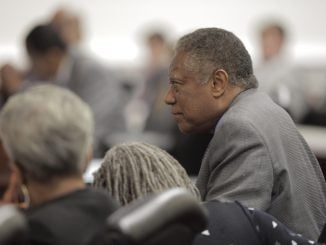RALEIGH — After speeding through several committees, the North Carolina House and Senate each passed bills designed to protect girls’ sports last week in an emotional day at the General Assembly.
The NC House passed House Bill 574, the Fairness in Women’s Sports Act, on April 19. Athletic teams designated for women may not have members of the male sex and vice versa, according to the bill. The only exception is the case where there is no comparable sports team for females available and the sport in question is not a contact sport.
House Bill 574 passed by a vote of 73-39 and had bipartisan support as Reps. Garland Pierce (D-Scotland), Michael Wray (D-Northampton) and Shelly Willingham (D-Edgecombe) voted in favor. Rep. Tricia Cotham (R-Mecklenburg), who recently left the Democratic Party, voted in favor of passage. She had also voted in favor of the bills in two committee meetings prior to the floor vote.
As of this spring, around 21 states have either enacted or filed similar legislation.
The House measure went through two committees and a floor vote with a noon press conference promoting its passage.
The same day House Bill 574 flew through committees to a passage vote, the Senate also advanced its companion bill, Senate Bill 631. The primary sponsors for the bill include Sens. Vicki Sawyer (R-Iredell), Kevin Corbin (R-Macon) and Joyce Krawiec (R-Forsyth).
On April 20, the Senate passed the bill by a party-line vote of 29-18.
During the debate in a Senate Education/Higher Education Committee meeting on April 18, things got a heated as Democrats repeatedly labeled the bill as “anti-trans.” In response, Sawyer shot back, stating, “This bill is not about being anti-trans, this bill is about being pro-woman.”
Primary sponsors of House Bill 574, Rep. Jennifer Balkcom (R-Henderson), Kristin Baker, (R-Cabarrus) and Rep. Erin Pare (R-Wake), entered the House’s Judiciary Committee hearing with a special guest: Riley Gaines, a 12-time All-American swimmer out of the University of Kentucky with five SEC titles and a two-time Olympic trial qualifier as well as being the SEC record holder in the 200 Butterfly.
In recent months, Gaines has been a fixture in the headlines after a transgender swimmer named Lia Thomas was awarded the trophy at the March 2022 NCAA championship even though Thomas and Gaines had tied. Officials had told Gaines she had to go “empty-handed” because Thomas would get the trophy for “pictures.”
Gaines pushed back against being forced to compete against a biological male and began advocating to save women’s sports.
“I felt betrayed and belittled and like my efforts and sacrifices I had made had been reduced to a photo op to validate the identity and feelings of a male,” Gaines said in her testimony.
“But that is not all, in addition to being forced to give up out awards and titles and our opportunities,
the NCAA forced female swimmers to share a locker room with Thomas — a 6-foot-4, 22-year-old male equipped with an exposing male genitalia — and a room full of vulnerable undressed women,” Gaines said. “Let me be clear: we were not forewarned about this arrangement, no one asks for our consent and we did not give our consent.”
Thomas competed in male swimming competitions at the University of Pennsylvania as Will, ranking 554th in the 200 freestyle and 65th in the 500 freestyle during the 2018-19 season — much lower than Thomas ranks in women’s competition.
Gaines was not the only athlete to testify. Joining her in the rounds of testimony given to various committees were former UNC women’s basketball coach and Hall of Famer Sylvia Hatchell; former ACC referee and supervisor of referees Judy Stroud; and Idaho legislator Barbara Ehardt, who founded the Save Women’s Sports movement.
Another athlete bringing her story to the General Assembly was Payton McNabb, a now-former volleyball player who gave testimony of how she was injured during a match between her school, Hiwassee Dam High School, and a team with a transgender athlete. She described how she was knocked unconscious and sustained a concussion after the transgender player spiked a ball directly into her head.
As a result of the incident, Cherokee County’s School Board voted to forfeit all future games against Highland or any team with a transgender athlete. The board cited concerns for the safety of the female athletes, but it also meant McNabb’s team wouldn’t be able to compete at state conferences due to the forfeitures.
McNabb also told committee members she had to quit the rest of the season and is still enduring pain and other neurological injuries, and that she was now also having learning issues.
“I understand there was one report at a volleyball game where it’s unclear if the athlete was a trans athlete and if that was the reason, injuries happen,” Sen. Natasha Marcus (D-Mecklenburg) said of McNabb’s injury during the April 18 Senate Education/Higher Education Committee meeting. “I will point out injuries happen in sports all the time. We don’t need legislation to try to protect everyone and in every case.”
During the House Judiciary Committee meeting, Rep. Pricey Harrison (D-Guildford) made remarks similar to that of Marcus concerning McNabb’s injury but also called the bill a “solution looking for a problem” while citing a statistic that only one out of a dozen or so transgender athletes who have applied to play sports in the state was actively playing.
Democrats in all committees where the bills were heard repeated the same talking points as well as claiming the bills would run afoul of expanded Title IX changes being proposed by the Biden administration that would essentially penalize any state or school not allowing biological males who identify as females to play on the team of their choice by withholding federal funding.
Testimony on the bill was also heard in the House Rules Committee. Gaines and McNabb also testified at that meeting, along with Evie Edwards, a cyclist who has competed on an international level.
“I am a liberal woman. I am a wife, mother and a registered Democrat,” Edwards told the Rules Committee members. “Most of the people I associate with are open-minded. But we tend to agree, from a practical standpoint, that the inclusion of male bodies in female sport is unfair.
“Policies that force this ideology on girls and women are wrong and need urgent discussion. This should not be a partisan issue. I’m encouraged by the support of Republicans and baffled and disappointed by the lack of support from my Democratic Party.”
Later in her testimony, Edwards underscored that this was about fairness in women’s competition, citing the biological advantages of males over females and stating that despite how a transgender may identify, “Bodies compete, identities don’t.”
In an interview with North State Journal, Edwards also said women’s sports are in danger but men’s sports aren’t, noting that female athletes and their families are kept in the dark if a transgender athlete is playing on a team or changing in the women’s locker rooms. She also referenced the North Carolina High School Athletic Association’s “gender identity policy” that allows transgender athletes to participate in sports teams with no requirements other than “self-identification” and with no requirement documenting a medical transition or use of puberty blockers.
Opponents of the bill also gave remarks to the various committees, including representatives from national LGBTQ advocacy groups like The Human Rights Campaign and state-level groups like Equality NC.
Supporters of the bill outnumbered the opposition throughout the day, which included a large entourage with the conservative NC Values Coalition led by Executive Director Tami Fitzgerald.
“NC Values has been working for three years to advance a bill to guarantee a level playing field for girls in sports. Allowing biological males who identify as women to compete against girls in sports puts an end to women’s sports, takes away girls’ opportunities and jeopardizes their safety,” Fitzgerald said.
Fitzgerald’s organization also circulated results of a statewide poll showing just more than 71% of North Carolinians do not believe biological males should be allowed to play on female sports teams.




